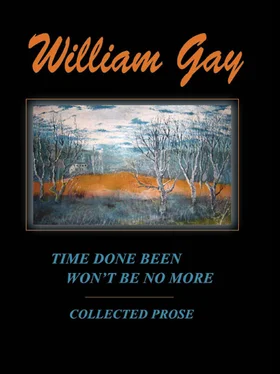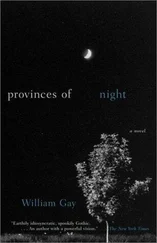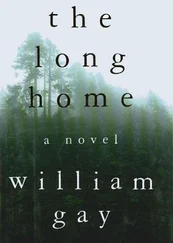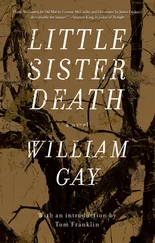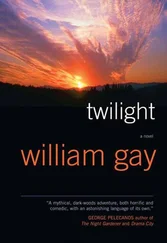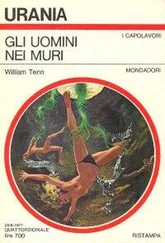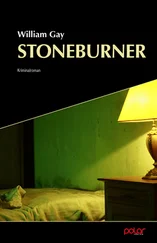By the time we rode out to the Bell farm, a lot of time had passed, and he had settled down, quit drinking, and become a respectable family man.
At the time the cave was private property (it still is, but it’s set up as a tourist attraction), and we weren’t allowed to see it, let alone go inside. So we talked to a few locals, went looking for the graveyard and whatever remnants of Bell’s old log home that might remain. The graveyard is in a cedar grove a mile or so off U.S. 41, and it’s not easy to find. But it’s been found time and again by vandals, who stole Bell’s original tombstone and even dug up some of the graves. All that remains of the house are a few of the stones it used to stand on.
It was dark before we found our way out of the woods, and though we were trying to maintain a degree of detached curiosity, it was undeniable that this was an eerie place.
A few months later my uncle and his wife turned up at my house in the middle of the night with a strange tale. H looked nervous and haggard, far from the cool and collected man I was accustomed to. Something had jarred him, and he didn’t take long getting around to it.
That thing has followed me home, he said.
Life had gone on, and I didn’t know what he was talking about. What thing?
That Bell Witch, or whatever it is. We keep hearing things, seeing things. It’s about to drive us crazy.
What kind of things? I asked.
We’ve heard voices. People mumbling, but you can’t hear what they’re saying. A hell of a racket that sounded like you’d dropped a chest of drawers from the ceiling and smashed it on the floor. You go look and there’s nothing there. The other night I looked out the kitchen window and saw this ball of blue light just rise up from the ground and move off into the woods.
I didn’t know what to say.
We want you to sleep in that bedroom where we hear that stuff, he said. If you hear something, at least we’ll know we’re not going crazy.
There was no way I wanted to do that. But by now I was trying to get down the road and back myself, and I had a reputation to maintain. I was also hoping this would turn out to be his idea of a practical joke.
All right, I said.
This is what I heard, or think I heard:
I couldn’t sleep, and I kept a light on. At about three in the morning I was reading an old copy of Reader’s Digest when I heard a chuckle, a soft, malicious chuckle of just a few seconds’ duration. It seemed to come from no particular point in the room.
I thought it was a joke. I jerked open the bedroom door. There was no one there. I went through the house. Everyone was asleep.
It was a long time until daylight.
What did I hear? I don’t know. Did I really hear it at all? I don’t know that, either, and I wouldn’t argue it either way. It doesn’t seem to matter. You hear what you believe you hear.
My uncle lives in West Tennessee near a town named after Joshua Gardner’s brother, and I called him the other night.
Did you really hear all that stuff in that house, or were you just pulling my leg? I asked him.
We heard things right up until we sold the place and moved, he said. It sort of died down, but every now and then we’d hear something. You’ll notice nobody lives too long in that house. It’s changed hands several times since we sold it.
I told him I had been back to Robertson County and that I was writing an article about the Bell Witch.
It might be best to leave that stuff alone, he said.
I don’t know if there’s any truth in all this business. Because almost two hundred years have passed since the original haunting supposedly occurred, I don’t suppose anyone else will know. But I do know that the world is a strange and wondrous place. There are mysteries on every side if you care to look. I also know that I don’t know nearly as much now as I thought I did at twenty-five. If I stacked the things I know next to the ones I don’t, I wouldn’t have a very tall stack
Every question is multiple choice, and truth depends on your frame of reference. It sometimes seems an act of hubris to even form a conjecture.
I’d leave that stuff alone , I heard time after time from one source or another, and it might be worth remembering that the Bell Witch saved her strongest malice for scoffers and debunkers. It might be wise to keep one’s disbelief to oneself.
On the other hand, she was clairvoyant. So it might be best not to think about that stuff at all.
TIME DONE BEEN WONT BE NO MORE (But See That My Grave Is Kept Clean)
SEE IT AS A TREASURE CHEST or, more aptly, a Pandora’s box unleashing into the world not evil or hardships or death but ruminations and lamentations and commentaries upon them, fading picture postmarks mailed from a world that was already growing remote in 1952. That was the year Harry Smith released his Anthology of American Folk Music , and it must have been something to see: eighty-four songs on six LP records, two discs each for the three volumes, each volume with a title: Ballads, Social Music , and Songs . All in an elaborate, metal-hinged album accompanied by Smith’s surreal liner notes in a homemade booklet festooned with occult and arcane symbols.
The LP format was new in 1952. No longer was a record restricted to one song per side. Now each side could contain a series of songs, and the producer could play with them, arrange them in any order he chose. This was a revolutionary concept, and Harry Smith made the most of it.
The Anthology is a case of the sum being greater than its parts, and Smith achieved this because he heard sounds not just as themselves, but in relationship to other sounds, and set out to make a sort of aural hologram. Perfectly ordinary voices, even pleasant voices singing pleasant songs, are interred side by side with brief three-minute vignettes of darkness that light will not defray, horror that is only heightened by its contrast with the ordinary, so that some of the voices sound like screeches and mumbles and whispers leaked through mad-house walls, while the normal world continues without a misstep or altered heartbeat.
His thinking, in the sequencing of the Anthology , is so strange as to be almost beyond comprehension, but there’s a clue on the cover of the original liner notes. A drawing shows the hand of God tuning a dulcimer to the Celestial Monochord, tuning it to a Heavenly harmony that unites Air, Fire, Water, And Earth. His plan was to tie together the four volumes of the Anthology in a similar fashion, but only three were released in ‘52. (the fourth, which Smith apparently meant to represent Earth, was put out last year by Revenant Records.)
There wasn’t much of a market for folk music in 1952, other than prettified versions of songs like “On Top of Old Smoky” and “Goodnight Irene”, sweetened and made palatable enough for Your Hit Parade. To a generation of ears attuned to Perry Como and Patti Page, the Anthology’s old hardscrabble songs full of loss and death must have sounded totally alien, rantings and ravings and exhortations from another dimension.
Although the bulk of the songs was recorded only twenty-five or so years earlier (between 1927 and 1932), they seemed to be coming out of a world far more remote than that. This was not easy-listening music, it was not soothing Muzak played in the background as you lived your life. This was darker stuff. There was something there, crouched down out of sight, but you had to squint to see it. You had to meet these songs halfway, and the halfway point was not always a pleasant place to be. Sometimes it was alien, too: A coal mine in West Virginia; a plank road that began nowhere and led circuitously back to the same place; a claustrophobic block in the French Quarter that existed nowhere save in the geography of Richard Rabbit brown’s James Alley Blues; an old railroad camp (where Bob Dylan would find a verse he’d later use, like scrap lumber replevied to shore up “Stuck Inside of Mobile with the Memphis Blues Again”); an unreal geography in a cold, sourceless sepia light.
Читать дальше
